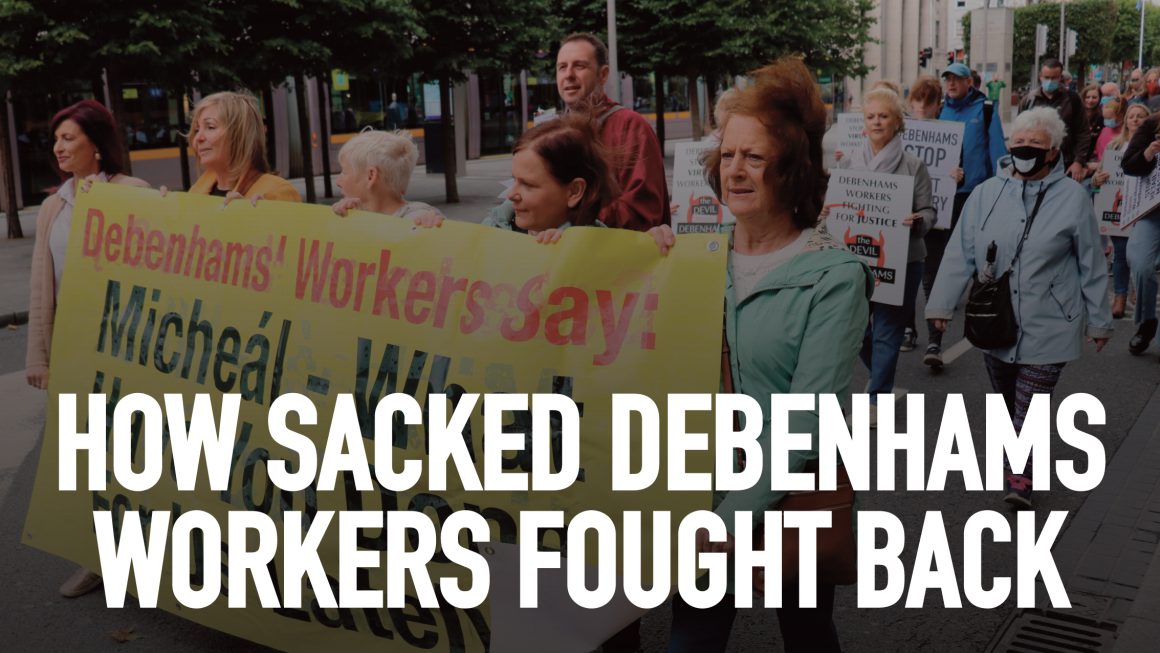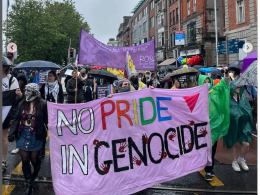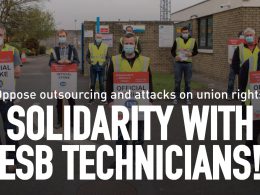By Ruth Coppinger, pamphlet published August 2020
Introduction — an inspiring struggle by workers
The struggle by Debenhams workers over the last four months has been inspiring. The way in which the workers reacted to their mistreatment, organised themselves despite so many obstacles and sustained a battle against a global corporation has been an example for workers not only in Ireland, but internationally.
Debenhams workers have laid down a marker to any company thinking of dumping their workforce. They’ve put the Irish legal and political system on trial when it comes to the rights of workers. They’ve also inspired many other workers and trade union members facing Covid and shone a spotlight on the lack of fight at the top of the unions.
For members of the Socialist Party who’ve been helping and assisting the workers going right back to April, it’s been a hugely positive experience. For socialists who want to create a society free from exploitation and oppression of all kinds, the struggle by Debenhams workers has reaffirmed the power of working-class people to fight the inequality that’s part and parcel of this profit-driven capitalist system.
Power of workers, power of women
One of the main lessons from this dispute and the pandemic in general is that it’s workers who are the key force in society. Nothing moves without workers moving. From the frontline workers in the health service who’ve shown total selflessness and have the skills to save lives, to the retail workers who proved themselves essential to society continuing to function.
How ironic that these are the very workers — overwhelmingly women — who’ve been historically underpaid and undervalued. The workers being applauded now are the ones who had to take to picket lines in recent years against pay inequality and for decent work conditions.
It’s no surprise that the workers fighting back at Debenhams are overwhelmingly women. Women have been most impacted by Covid-19 because the sectors most affected by jobs cuts, such as retail, are majority female workforces — but also because women tend to be in lower paid, part-time and precarious work. Women also tend to experience sexual harassment and violence. something women workers are now increasingly unwilling to accept. Even in non-union workplaces, women have led recent walkouts and strikes on sexual harassment at Google and McDonald’s.
Women have led the way in two of the most important recent movements in Ireland — the anti-austerity water charges victory and the repeal referendum for abortion rights.
Capitalism and sexism
The profit system benefits greatly from sexism, racism and all sorts of division between ordinary people. It relies on the gender pay gap — which is growing — and on women being concentrated in lower paid jobs, but even more so on all the unpaid work women do in society.
The charity Oxfam regularly publishes wealth research. This January it reported:
- Women and girls put in 12.5 billion hours of unpaid care work every day (e.g. looking after children and elderly) — a contribution to the global economy of at least $10.8 trillion per year and more than three times the size of the global tech industry.
- Women do more than three-quarters of all unpaid care work.
- 22 men have more wealth than all the women in Africa combined.
The Socialist Party wants to assist workers everywhere in making working-class power stronger and in helping workers get more organised. This short pamphlet is to draw out some of the lessons from the Debenhams struggle to help us all do this.
Dumped in a pandemic — background to the dispute
The Debenhams workers were unceremoniously dumped by a global corporation, using a global pandemic as an opportunity to shed workers, suppliers and creditors and to protect the interests of their shareholders. Despite the trials of the pandemic, Debenhams is still now trading in over 122 stores in Britain, Northern Ireland and seven stores in Denmark. Debenhams is enjoying considerable state assistance, rent cuts, rates holidays etc in Britain and Northern Ireland.
Around 1,500 workers in Ireland directly employed by Debenhams — and hundreds more working in concessions within the department stores — were sacked by generic e-mail, having been assured days before that their jobs were safe. Many had decades of service going back to Roches Stores. And now, all security was gone. Previous redundancy agreements were thrown overboard as the company sought to go into liquidation.
To lose a job in any circumstances is traumatic. To do so during a pandemic without recourse to the normal means of responding even more so. The normal means of talking to workmates, organising meetings, discussing with your union were all unavailable.
Above all, the Debenhams parent company must have rubbed their hands in glee at this chance to cut their losses. They would have known that the very first instinct of workers would be to occupy the shops if they were open, to sit in to demand either their jobs were saved or their redundancy arrangements respected.
While of course a threat to their profits, the state closures of the retail sector for necessary health reasons was a gift to many bosses. Oasis, Warehouse, Mothercare, Quiz, Monsoon and many more retail chains followed suit, either fully or partially closing stores.
And yet there was no specific response by the Irish government to this retail jobs massacre.
The Debenhams workers were also unfortunate in that a general election had left a political limbo with the old government still in place, no new government to clearly target and no regular Dáil sittings.
Meanwhile, the response of the trade union movement overall was either non-existent or lacking. Throughout the Covid crisis, as jobs and wages were in freefall, the Irish Congress of Trade Unions (ICTU) took no decisive action. The ICTU did make a strong statement on the question of income supports early in the lockdown. If they had been equally vocal and active around Debenhams, opportunistic lay-offs and the gutting of the retail sector, it might have yielded something.
With some notable exceptions — such as construction, parts of hospitality etc — union leaderships succumbed to the idea that it was inevitable workers would pay the lion’s share for the crisis. They were sucked into the constant background rhetoric during the pandemic of “we’re all in this together”. But the reality should have been clear to the leaders of the unions. As was seen in the crisis of 2008, workers and the poor would be made to pay — unless a real challenge was put up.
As well as their Irish operation, Debenhams cruelly dumped Bangladeshi workers without a penny in compensation. These are workers and families with no state supports. Workers in Ireland raised €15,000 in a GoFundMe for the Bangladeshi workers in a real show of solidarity, in contrast to their employers.
Even companies with vast reserves built up from years of profits, such as in aviation, were using the pandemic to enforce massive pay cuts and a race to the bottom in conditions. Yet at airlines with heavily unionised workforces, such as Aer Lingus, the response of the SIPTU union leaders was to concede these things without workers even having a say — not even insisting on time to hold a basic ballot of members! Cabin crew members of Fórsa insisted on this right and mobilised to win a strong rejection of draconian conditions, at least putting themselves in a position to resist.
Retail jobs massacre
As the trade union representing most of the retail and bar sector, Mandate was seriously put to the test with Covid-19. And of course the retail sector had been under huge pressure anyway from online buying.
With almost 1,000 Mandate members — in a company which did actually recognise the union because of pre-existing arrangements in Roches Stores which Debenhams acquired — a huge battle by the Mandate leadership was expected by the members. After all, the union would lose a huge chunk of its membership if the jobs were lost.
While e-mails and letters were duly sent by the union to the company and subsequently the liquidators, there was a formalistic and limited approach. The workers themselves were forced to take the initiative. SIPTU also represents some Debenhams workers and proposed no plan of action.
Emergency pandemic laws had been brought in which effectively banned public protest. This was something the Socialist Party had warned and spoken against in the Dail when being introduced. Mick Barry TD was the only voice of dissent warning these laws could be used against workers in a strike or dispute situation. And they quickly were.
Getting independently organised
Stuck at home, the Debenhams workers were coming to terms with their plight. Only able to communicate with long-standing workmates in Whats-App groups, they didn’t want to take their treatment lying down. They considered how they could respond.
One of the strengths the workers had was an organised shop steward and activist layer within the union. Some workers in Cork contacted Mick Barry, Socialist Party member and Solidarity TD. They kept in contact with each other and the Cork workers mentioned the idea of a protest at the store. Other workers in Blanchardstown contacted Ruth Coppinger, who had been a TD for the area prior to the February general election.
From this, a suggestion was made to link up workers throughout the stores on a Zoom call. Store-by-store online meetings was something the union itself hadn’t organised.
On these calls, a discussion took place and a plan was agreed to carefully and safely stage protests at as many Debenhams stores as possible to draw attention to the sackings. This technically breached the Covid legislation, but it was decided to limit the length of the protests, confine numbers to 10 on each protest or group of protesters, with clear social distancing measures.
Workers also proposed to wear black. They made their own signs, often with the Debenhams logo and font, and devised their own slogans, such as “You can’t walk away and not pay” and “Do a bit of decency”, a play on Debenhams’ own slogan.
A press notice and statement was drawn up, with two shop stewards – Jane Crowe and Valerie Conlon, based respectively in Henry Street, Dublin, and Patrick Street, Cork — as spokespersons. While Mandate was informed of the proposal for the protests, it was workers themselves who chose to act.
It’s understandable that trade unions were worried about potentially breaking laws and about public reaction to any threat to health. However, if workers were seen to be responding in a safe and very considered way, in an essential defence of their jobs and livelihoods, then the protests could be seen as justified and understood and supported by the public.
First pandemic protests by workers
Because of the skill and thought of the workers, and with advice from Socialist Party reps, the first day of protests was a massive success. What was happening at Debenhams was publicised nationwide. The workers got to speak for themselves.
And, significantly, a high-handed and imbalanced response by Gardaí at one store backfired and led to even further public sympathy.
On Henry Street, a group of workers who arrived to stage a protest at the Debenhams store were met by Gardaí and told to move on. They were effectively forced off and accompanied away from the shop. Some workers, including the shop steward, had their names taken by Gardaí. The media who had been alerted to the protest covered this.
The cutting across of the protest was highly publicised. It was seen as being totally unfair, especially when a far-right protest at the Four Courts nearby, which wasn’t socially distanced, was allowed to go ahead. The Garda action against workers backfired. #Debenhams trended on Twitter that day.
The first day of protests, which hadn’t been organised or officially sanctioned by the union, was a shot in the arm for the workers and put their case into the media and somewhat onto the political agenda.
On the second day of protest at Henry Street, workers carried a banner they’d made saying “This is an essential protest” — a reference to the regulations which only allowed essential journeys, and a clear attempt to stop Garda interference and maintain public support.
Political pressure
The successes led to more discussions by workers and a further series of protests at the stores; at Bank of Ireland, which part-owned the parent company and which had been bailed out by ordinary people; and also at the Dáil, when sittings resumed.
Without these independent protests by workers, the issue of Debenhams wouldn’t have been kept alive through the difficult pandemic period. The liquidation would have proceeded, stock would have been sold off and the workers left with only statutory redundancy. Instead, Debenhams workers kept the struggle going and brought their issues centre stage into the formation of the new government at the Convention Centre at the end of June.
The workers decided they had nothing to lose and could at least give themselves a fighting chance of winning an enhanced redundancy.
The case for the state to save jobs
Revealingly, the demand to save jobs was never seriously posed anywhere during the pandemic by the trade union leadership to the main political parties. By the second protest, Debenhams workers were using the slogan of ‘Stop the Retail Jobs Massacre’ and calling on the government to intervene to save jobs. They called for this to be made an issue in government formation talks.
With extensive financial research done by one of the workers, the case was made that — given that the state would inevitably end up propping up retail and the private sector during Covid-19, and given the costs of 1,500+ workers being thrown on the dole — the government should step in, invest money to keep the stores open and look to take ownership of Debenhams.
Contrary to the Debenhams and media narrative, a number of stores were profitable and others could be made so with the negotiation of rent cuts and a range of other measures being taken. State investment and a business plan, with workers at the heart of the running of the company, could reopen the stores.
The workers believed the need for wholesale compulsory job losses could have been avoided. With less investment than it would take supporting families on social welfare, a whole number of stores could immediately. Redeployment and small-scale voluntary redundancy for workers near retirement could be looked at.
Unfortunately, the idea of public ownership to save jobs — nationalisation — is rarely if ever advanced anymore by union leaders who largely accept the limits and rules of capitalism. They’ve bought into the notion that private ownership and the profit motive is the only viable economic model, with pleas made to the employers to be fair and for governments to throw in a few reforms that favour workers.
Harland & Wolff occupation for jobs
A striking exception recently was when the historic shipyard at Harland & Wolff in Belfast faced closure in the summer of 2019. Instead of simply negotiating redundancies, the workers called for the government to nationalise and take over the shipyard to save jobs and vital skills. The workers occupied the shipyard to strengthen their case. After a militant battle that drew support from across the community and the island, the workers held out. Although the government didn’t nationalise, a new buyer was eventually secured and the yard kept open, with jobs maintained.
During the battle, the workers also put forward the idea of diversifying to produce wind turbines — productive alternatives given the climate change crisis.
State ownership and diversification are options Mandate and other unions could have looked at and advocated in relation to Debenhams.
Socialist origins of Irish trade union movement
The trade unions in Ireland were built from a radical perspective. Founders like James Connolly and Jim Larkin had a vision. They believed another world was possible. They understood that workers, not capitalists, are the ones who actually create the wealth in society. They believed working people should own, control and plan that wealth in the interests of the majority.
In Socialism Made Easy, Connolly explained how workers are effectively wage slaves and the bosses or capitalists profit from private ownership of production, living an increasingly idle life and acting as a barrier to human development.
Union leaders sometimes invoke Connolly and Larkin, but more in a nostalgic way, with relevance only to a crueller bygone era. While of course workers have won fundamental rights in more advanced capitalist countries in comparison to that period, those can be taken away at any time — as seen by what’s happening to Debenhams and other workers during Covid.
Historic levels of inequality
The reality of capitalism now is that wealth distribution is much more unequal than it was in Connolly and Larkin’s time, and growing more unequal by the day.
Oxfam figures showing the level of wealth inequality give a glimpse of what could happen if that wealth was used to benefit humanity rather than enrich an elite at the top:
- The 26 richest people in the world have the same wealth as 3.5 billion people — half the planet’s population
- Half the world’s population lives on less than €5 a day
- If the richest 1% paid even half a percent more in tax for 10 years, it could create 117 million jobs in health, education and childcare.
Every time large corporations are allowed to sack workers, pay no redundancy or pay low (or no) tax, this wealth imbalance increases.
It’s not possible to have decent public services – health, education, childcare, care of the elderly, special needs supports etc — when the wealth that workers create is left in the hands of a parasitic elite and left untapped and untaxed by the governments that support this.
The urgent additional feature now is that capitalism and private ownership of the world’s natural resources is leading to the destruction of the planet itself. Unless we take on capitalism, we can’t take on climate change.
A system rigged against workers
Many Debenhams workers have had their eyes opened as to how the system is rigged against working people. From the heartless way they were sacked by Debenhams; to having their redundancy robbed; to the liquidation process where workers were sidelined — all the laws are geared to the bosses, none to workers. While immoral, it seems it’s perfectly in order for a multinational to saddle a subsidiary with loans and debts while the assets, stock and profitable online business are siphoned off by the parent company.
The workers’ call for the books to be opened up was ignored. Research done by one worker actually showed the financial situation of the company to not be as dire as was being claimed.
At no time did the liquidator, any political parties outside the left, or indeed any financial journalists, show much interest in lifting the veil and revealing these truths. There was complete complicity — ‘nothing to see here’. There has been huge frustration and anger for Debenhams workers at how disinterested official Ireland is in such barefaced robbery.
The Irish establishment & big business
Many Debenhams workers are shocked that the Irish government hasn’t brought in laws to stop companies asset-stripping and reneging on redundancy deals, particularly after the experience of Clerys.
The Irish establishment has a particularly cowardly attitude to multinational companies (MNCs). Irish industrial policy centres on attracting foreign direct investment with one of the lowest corporation tax regimes in the world, as well as a host of grants and incentives. This is because Irish capitalism is historically weak and unwilling or unable to generate a native industrial base.
So pathetic is the Irish government’s subservience to MNCs that the idea of trying to challenge Debenhams in any real way wasn’t on their agenda. No example has been shown of any government ministers calling Debenhams out or even phoning them or seriously seeking meetings with them.
Even the EU Commission had to act to try to prevent Ireland getting a competitive advantage over other capitalist countries with such a blatant low/no tax policy. Thus we saw the farce of the Irish establishment going to court against the Commission to prevent Apple, one of the richest companies on the globe, from paying taxes.
It’s not a ‘loophole’ that workers get left high and dry when firms close — successive Irish governments have made a conscious decision not to legislate to prevent this. They favour a regime where workers’ rights are weak and those of big business are strong. It’s not accidental. And it explains why — even now, years after the Duffy-Cahill report — the current FF-FG-Green government is only talking about another ‘review’, not actual legislation, in the autumn.
They will only be forced to legislate if the power of the trade union movement is brought to bear on them, or if political change is brought about and a left government put in power to do so.
Huge credit is due to the Debenhams workers for putting this issue firmly on the agenda of the new government in the first place through their independent actions.
Keeping the battle going
The rank-and-file Debenhams workers and a number of their shop stewards have kept the battle going despite many barriers. In a number of shops, there’s been a turnover of shop stewards who moved on and were replaced by newer shop stewards who wanted to carry on the fight. These shop stewards represented the big majority by mid-July.
While many Debenhams workers had themselves moved on or weren’t participating in protests or pickets, a sizable number have stayed involved and, in some cases, more began to take part when protection of the stock came on the agenda.
The stock
Mandate held a ballot of members during the dispute on taking action to prevent stock being removed unless workers got redundancy from the company. 97% voted for strike action — a massive endorsement.
A dispute has raged about who owns the stock and online business, with the Debenhams parent company trying to claim it. But whoever gets to legally own it, the Debenhams workers instinctively understood the stock was their last leverage in any bargaining with the company to pay them redundancy.
It was workers who watched the stock throughout the months in case secret attempts were made to move it. Workers established round-the-clock watches themselves. They also took the decision on when to begin officially picketing their stores when the retail sector opened up again.
At one point, one Mandate official told workers the picket was “fanciful”. This sort of message inevitably had a demoralising impact on some workers, who chose not to take part throughout the four months. Yet, two days later, the union leadership released a video calling on members to support the pickets — what had changed? Nothing, except the workers taking matters into their own hands and driving the strike themselves.
Reclaiming & transforming the trade unions
One of the clearest lessons from the Debenhams dispute is that workers will always seek and find ways to fight back and defend their interests. That’s why trade unions were formed in the first place. But many workers are finding, even when they’re in a union, they don’t get the leadership they need and there’s an array of laws preventing them taking the type of action they need.
Above all, the solidarity actions needed to win, even from other workers in their own union or workers in the same company in another state, are either outlawed or never brought into play by the ICTU.
The Industrial Relations Act is now 30 years old. It introduced many of the restrictions on unions, picketing and on solidarity action.
Anti-union laws coincided with the union leaderships joining governments and employers in ‘social partnership’ deals, where very modest pay rises (often tied to cuts in staff numbers and conditions) were agreed to in return for no strikes. This has had the effect of largely killing off activism in the unions. It has helped a bureaucracy to form at the top of the unions, with general secretaries who are paid huge salaries, a million miles removed from those they represent.
It has also led to unions not struggling alongside their members as was the case when the unions were founded, but focusing instead on providing services or lobbying politicians for changes in the law.
Trade union membership has also drastically declined: from a height of 70% in the 70s and 80s to around 25% today. Union density in the private sector is now as low as 10%. The proportion of unionised workers under 30 is only 12%.
The only way of reversing this decline is by unions really fighting on behalf of workers and winning victories which inspire workers to join. It’s essential that unions actively go out and recruit young, unorganised and precarious workers.
But even the current numbers of people in trade unions represent a powerful force to be reckoned with. And, as has been shown by, for example, McDonald’s and Google workers who struck against sexual harassment, workers can take powerful collective action when not even in a union.
The unions need to be transformed to become real fighting instruments for workers. These are some points that could be discussed and raised in the unions:
- No to social partnership deals — the bosses are not our partners;
- Defend every job and accept no cuts in pay, pensions and conditions. Have a struggle-based approach to organise workers to defend these;
- Unions should call for democratic public ownership, under workers’ control, of firms threatening closure or job losses. This will become all the more necessary in the Covid era;
- Break the Industrial Relations Act 1990 and other legal impediments to lightning strikes, effective picketing and solidarity action;
- All full-time officials and leaders of trade unions should be elected by the members, with the right to be recalled or subject to re-election;
- Full-time officials must be paid only the average wage of the workers they represent;
- Revive the movement of Connolly and Larkin – Democratic transformation of the unions by the members reclaiming them from the bureaucracy;
- For a trade union initiative to build new mass parties of and for working-class people — in the North, this means a cross-community, non-sectarian party to unite Protestant and Catholic working-class people and give an alternative to Green and Orange politics.
Why working people will have to fight
The coronavirus has infected millions worldwide. Most scientific and medical experts warn the situation could even continue for some years. Covid has shown how incapable capitalism is, as a system run for private profit, to handle of handling a health crisis of this proportion. It’s been the heroic efforts of health workers, scientists, firefighters and many others who risk their own lives to contain the virus. which have been key.
But all the economic and political decisions of recent years have left an underfunded public healthcare system and other public services unable to cope. Italy, for example, had almost five times more hospital beds per head of population in 1975 compared to today.
Epidemics are not new in history, but humans and the economy are more susceptible now due to factors such as deforestation, factory farming, road building, international travel and so on. However, coronavirus is only the trigger for a major world recession, not the fundamental cause.
Debenhams workers have been early victims of the pandemic, but unfortunately they won’t be the last. Many other companies and the global elite will seek to make workers and the poor, not their shareholders, pay for this extreme crisis. Debenhams workers are giving an example of resistance for others to follow.
Many workers may have thought their lives were secure and on a certain path, but these certainties are being shattered, unfortunately. For young people, this will be the second recession many have experienced! Combined with a severe housing crisis, increasing precarious work and the disaster of the climate crisis, millions of young people are seeing that this system has nothing to offer them and no way forward. Something new must be fought for.
The Socialist Party wants to discuss with workers, young people and all those who are becoming aware and politicised by these experiences about how such an alternative future can be built.
Never before in history has there been so much abundance of wealth and talents to make it possible for every single person in the world to have a home, a decent income and a huge high quality of life; to provide health and education; to wipe out discrimination.
Socialism means the wealth workers create is taken out of the hands of a useless elite and put into the ownership and control of the working majority in society. It’s workers who are essential, not the likes of the richest man in the world — Amazon boss, Jeff Bezos — who makes $2,489 every second and $149,353 every minute.












